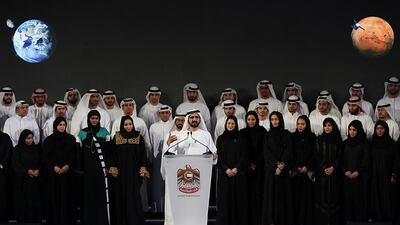Have you ever wondered why many of the stars have Arabic names? The region’s scholars and scientists were pioneers in astronomy, mathematics and navigation. Part of this interest stemmed from understanding timekeeping and directions to perform daily Muslim prayers towards Mecca.
The need for accurate maps and ways to navigate and calculate distances was even greater for the pilgrimage to Mecca that every Muslim should make at least once in their lifetime. Scientists such as Muhammad ibn Musa Al Khwarizmi, the inventor of algebra, performed calculations on the positions of celestial bodies and produced maps of Earth with latitudes and longitudes. Al Idrisi, a geographer, produced an atlas of the world that was used for hundreds of years; his maps of the East were especially valuable.
Looking at the region today, the Arab world is predominantly a user of space technology rather than a developer of it; we utilise it on a daily basis, perhaps without even knowing or noticing. Much of the remote sensing data that is used in the region is sourced from foreign satellites and is usually used for a specific study in one sector rather than a constant flow of data for all sectors.
However, the region is waking up to the socioeconomic realities, and space technology is seen as a beacon to start transforming our economies and empower our youth who will be entering the job market. Countries have started to establish active space programmes, with Algeria, Egypt, Saudi Arabia and the UAE leading the way. These countries have focused on know-how and knowledge transfer through satellite development and scientific programmes to start development locally.
Algeria has built its own satellite, Saudi Arabia has a vibrant space education sector and the UAE has a long-term vision to explore space. These countries are now benefiting from the use of these space assets and are supporting the academic research community, environmental agencies, municipalities, mapping entities and logistics companies with space-derived data.
The Arab world is positioning itself to have a significant positive impact on the future of space technologies and their applications, including in security and stability, environmental protection, and water, food and energy security.
Space technology can help address the challenging security situation the Arab world. Constellations of thousands of small satellites will have the power to image anywhere in the world, stream live video feeds and pinpoint locations of potential danger to authorities quickly, efficiently and undetected. A combination of artificial intelligence, data mining, satellite images and communications systems would support detection and arrest of terrorists before they act. Pirates and drug smugglers would be detected immediately through geofences being monitored by satellites; any unauthorised ship, vehicle or person entering a pre-assigned location would be detected and tracked until apprehended.
Oil wells and pipelines — the economic lifeline of the region — would be monitored from space. Devices on the pipeline would monitor any type of data set and send messages if anything out of the ordinary arises, and live tracking of the incident from space would support the oil companies.
Space technology will support governments and decision-makers in making better decisions to protect the environment. Oil spills could be detected sooner and ships leaking oil could be easily tracked using satellite radar data. Pipelines seeping oil into the oceans and on land would be better detected. Monitoring of coastline erosion, the emergence of red tide algae and heat maps of cities would provide actionable data to support the reduction of greenhouse gas emissions in the region.
Water, food and energy security technologies that will be developed to support life in space will also help those of us on Earth, especially in the Arab world, where a large part has a very harsh climate and no access to clean water.
In the coming decades we may see astronauts living on Mars, and we will have to develop technologies that can support life on a much larger scale. The UAE has recently launched the first step in its Mars 2117 strategy with the development of the Mars Science City — a city that will simulate what life may look like on Mars and work to develop technologies that will make that happen, with a focus on water, energy and food research.
The Arab world has been relatively quiet in the first 60 years of the Space Age. The next 60 years will see a significant change, as a big part of the region’s future lies in the future of space exploration.
Salem Al Marri is assistant director general at the Mohammed Bin Rashid Space Centre
This article has been provided exclusively to The National by the World Economic Forum

